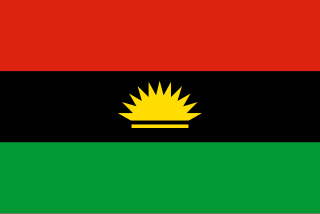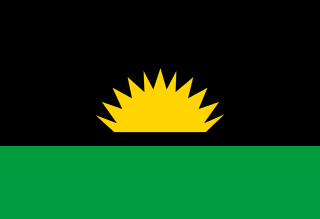
Biafra, officially the Republic of Biafra, was a secessionist state in West Africa that existed from May 1967 to January 1970. Its territory consisted of the Eastern Region of Nigeria. Biafra was formed as a result of the nationalist aspirations of the Igbo people of Nigeria, leading to the Nigerian Civil War. Nigeria declared war on Biafra shortly after its declaration of independence, eventually defeating Biafra and reuniting the two states.

The Republic of Benin was an ephemeral unrecognized secessionist state in West Africa which existed for one day in 1967. It was established on 19 September 1967 during the Nigerian Civil War as a puppet state of Biafra, following its occupation of Nigeria's Mid-Western Region, and named after its capital, Benin City, with Albert Nwazu Okonkwo as its head of government. The new state was an attempt by Biafra to prevent non-Igbo residents of the neighboring Mid-Western Region from siding with Nigeria following regional ethnic tensions early in the war. The Republic of Benin was officially declared even as the Nigerian federal forces were reconquering the region and ended the following day as they entered Benin City. The occupation of the Mid-Western Region turned residents against the secessionist cause, and was used by the Nigerian government as justification to escalate the war against Biafra.

The Nigerian Civil War was a civil war fought between the government of Nigeria and the Republic of Biafra, a secessionist state which had declared its independence from Nigeria in 1967. Nigeria was led by General Yakubu Gowon, while Biafra was led by Lt. Colonel Odumegwu Ojukwu. Biafra represented the nationalist aspirations of the Igbo ethnic group, whose leadership felt they could no longer coexist with the federal government dominated by the interests of the Muslim Hausa-Fulanis of northern Nigeria. The conflict resulted from political, economic, ethnic, cultural and religious tensions which preceded Britain's formal decolonization of Nigeria from 1960 to 1963. Immediate causes of the war in 1966 included ethno-religious violence and anti-Igbo pogroms in Northern Nigeria, a military coup, a counter-coup and persecution of Igbo living in Northern Nigeria. Control over the lucrative oil production in the Niger Delta also played a vital strategic role.
Philip Efiong was the first Vice President and the second President of the now defunct Republic of Biafra during the Nigerian Civil War of 1967 to 1970.

The Movement for the Actualization of the Sovereign State of Biafra (MASSOB) is a secessionist movement in Nigeria, associated with Igbo nationalism, which supports the recreation of an independent state of Biafra. It was founded in 1999 and is led by an Indian-trained lawyer Ralph Uwazuruike, with headquarters in Okwe, in the Okigwe district of Imo State.

The Biafran pound was the currency of the breakaway Republic of Biafra between 1968 and 1970.

The flag of the former Republic of Biafra consists of a horizontal tricolour of red, black, and green, charged with a golden rising sun over a golden bar.

The Ahiara Declaration: The Principles of the Biafran Revolution, commonly known as the Ahiara Declaration, was a document written by the National Guidance Committee of Biafra and delivered as a speech by the Head of State of Biafra Emeka Ojukwu in the Biafra town of Ahiara on June 1, 1969.

Rolf Steiner is a retired professional German mercenary. He began his military career as a French Foreign Legion paratrooper and saw combat in Vietnam, Egypt, and Algeria. Steiner rose to the rank of lieutenant colonel commanding the 4th Commando Brigade in the Biafran Army during the Nigerian Civil War, and later fought with the Anyanya rebels in southern Sudan.

This is a survey of the postage stamps and postal history of Biafra.

Dr Sebastian Okechukwu Mezu is a Nigerian writer, scholar, philanthropist, and publisher. He was involved in politics in Nigeria in the late 1970s.
The Invasion of Port Harcourt was a military conflict between Nigerian and Biafran military forces.
Operation Tail-Wind was the final military conflict between Nigeria and Biafra. The operation took place in the towns of Owerri and Uli, both of which were captured by Nigerian forces. The operation ended with General Odumegwu Ojukwu fleeing to the Ivory Coast and then president of Biafra Philip Effiong surrendering to Olusegun Obasanjo.

Nnamdi Okwu Kanu is a Nigerian pro-Biafra political activist, who is also a British citizen. He is the leader of the Indigenous People of Biafra (IPOB). Kanu founded IPOB in 2014. The main aim of IPOB is to restore the separatist state of Biafra which existed in Nigeria's Eastern Region during the Nigerian Civil War of 1967–1970.
Ogbunigwe also called Ojukwu Bucket was a series of weapons systems including command detonation mines, improvised explosive devices, and rocket propelled missiles, mass-produced by the Republic of Biafra and used against Nigeria between 1967 and 1970 in the Biafran War.

The Indigenous People of Biafra (IPOB) is a Biafran separatist and Igbo nationalist organization in Nigeria. Its main aim is to restore an independent state of Biafra in the South East of Nigeria through an independence referendum. The group was founded in 2012 by Nnamdi Kanu, a British Nigerian political activist known for his prominent advocacy of the contemporary Biafran independence movement. Supporters of IPOB are primarily Igbo.

Igbo nationalism refers to a range of ethnic nationalist ideologies relating to the Igbo people of southeastern Nigeria. While the term is defined as seeking Igbo self-determination by some, others argue that it refers to the preservation and revival of Igbo culture and, for others, the development of Igboland stemming from the philosophy, Aku luo uno, which means "wealth builds the home".

The Biafran Armed Forces (BAF) were the military of the secessionist state of Biafra which existed from 1967 until 1970.
The insurgency in Southeastern Nigeria is a military conflict that broke out in the city of Orlu, Nigeria on 22 January 2021, when the Nigerian Army moved to crush the paramilitary wing of the Indigenous People of Biafra (IPOB), the Eastern Security Network (ESN). The conflict escalated after the ESN managed to repulse the initial push by the Nigerian Army, but IPOB ended the initial crisis by unilaterally withdrawing the ESN from Orlu. After a few weeks of quiet, Nigeria launched a military offensive in the area to destroy the ESN. On 19 February 2021, IPOB declared that as of the day before, a state of war existed between Nigeria and Biafra. Three weeks later, another separatist group declared the formation of a Biafran interim government which was subsequently endorsed by IPOB. Since then, the Biafran separatists have begun to form alliances with other separatist groups in Nigeria and Cameroon. Despite these developments, the separatists claimed that their militant operations were mainly aimed at defending local communities from armed herders and bandits instead of fighting the Nigerian government. In late June, IPOB leader Nnamdi Kanu was arrested by Interpol and handed over to Nigerian authorities.


 Flag of the "Republic of Benin". Flag ratio: 1:2
Flag of the "Republic of Benin". Flag ratio: 1:2

 National flag of the Republic of Biafra. Flag ratio: 1:2
National flag of the Republic of Biafra. Flag ratio: 1:2






